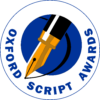Alan David Pritchard
Thank you Alan for taking the time to answer all of our questions. We are grateful for everything you have shared with us. At Oxford Script Awards we are wishing you a huge success with your next projects. Keep up the amazing work!
I was given a typewriter when I was 9 and started writing stories and poems on it. Later, as a teacher, I wrote plays in order to encourage my students to perform on stage. The plays won various amateur dramatic competitions. I also wrote a novel, 2 books of poetry and found a publisher for my plays. After discovering Film Freeway, I entered one of my stage plays (Red-Handed) into various festivals and it received such a good reception that I decided to convert it into a screenplay (One of Us).
I like the idea of putting characters into confined spaces from which they cannot escape and have to confront themselves and each other. This way, their essential truth can be revealed, despite, obviously, at the beginning, their not being willing to show their true natures. Their character reveal drives the plot, rather than the other way around.
‘One of Us’ is the adaptation of ‘Red-Handed’- a play about boys who attempt to steal exam papers. Because the stage play is set in a single location, the challenge with the screenplay was to find ways to expand the locations so it did not feel too theatrical. I did this by using flashbacks, flights of fancy and dream sequences.
The most important element of a great screenplay is making the audience care enough about the plight of the characters so they can be invested enough to spend time in their company.
I am just starting out in my screenplay writing career and do not have enough knowledge of the industry to be able to answer the question properly.
Having something to say that has universal relevance is the first approach – making sure I put the audience first – is my starting point. What do I want them to think? How do I want them to feel? What do I want them to remember when they leave the theater?
If the feedback is from those who know more than I and who criticise with the aim of helping me improve, then I am open to it considering their suggestions.
Yes, I am working on a two-hander, set in a school classroom between a teacher and a student from vastly different backgrounds who are forced to confront each other following the study of a literature text.
It will be great if more original voices are getting foregrounded. I feel a lot of movies and shows tend to be rehashes / remakes – and the new versions add nothing new. Also, how do creative writers compete with AI-produced scripts? That is the single most challenging aspect of writing as we move forward into the next few years.
It’s okay to copy someone else until you find your voice.
